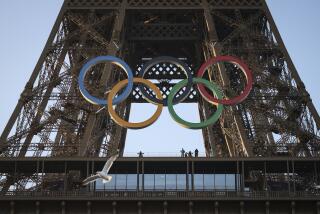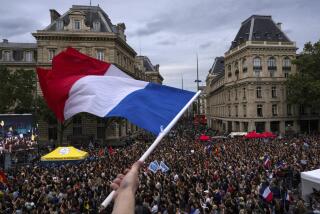Russian mayoral race takes Olympian turn
- Share via
MOSCOW — Who will be Russia’s host to the Olympics: the KGB-officer-turned-oligarch, the outspoken liberal reformer or the international fugitive wanted on suspicion of murder?
As Russia basks in the hard-won prestige of hosting the 2014 Winter Games, a symbolic battle for the country’s soul has erupted over an improbable prize: the office of mayor of Sochi, the Black Sea city where the Games will be held.
The men vying to run the sleepy seaside resort include some of the biggest personalities to boom through Moscow’s streets. At stake is a potentially lucrative position, as billions of dollars pour into Sochi to erect luxury hotels and sports arenas, and businesses scramble to curry favor with the local government.
More to the point, the mayor will open the Olympics as a symbolic ambassador of the Russia shaped by Prime Minister Vladimir V. Putin.
Among the candidates’ tortuous biographies, none is so noir as that of Andrei Lugovoy, who is wanted by Britain on suspicion of slipping radioactive poison into a dissident’s tea. Lugovoy, who capitalized on the notoriety of the accusation to win a seat in parliament, enjoys a kind of hero status among many Russians -- precisely because they believe that he did poison a government critic.
In an interview at his parliamentary office Friday, the longtime KGB agent said he hoped and expected to run for mayor in April, though he stipulated that a final decision had yet to be made. He said market research was already underway and predicted that the race would go to a runoff, and that he would “definitely” be among the final two candidates.
“Sochi needs a fresh force that will come in . . . and put everything in its place,” he said. “They say that Sochi shouldn’t be run by outsiders, but that’s a lie. It’s time for radical action.”
Looking natty and youthful in a neatly tailored suit and pink shirt, Lugovoy reclined in a deep leather chair. Behind him, a window framed the peaks of the Kremlin and St. Basil’s Cathedral. With an international warrant out for his arrest on suspicion of killing Alexander Litvinenko in 2006, the young nationalist lawmaker is unable to set foot outside Russia.
Lugovoy maintains that he was framed. And with a smirk, he said he should thank Britain for forcing him to travel in his own country. Protected by parliamentary immunity, he has roamed Russia, paying about 10 visits to Sochi in the last year alone, “mainly thanks to the filth in which the British prosecutor’s office put me.”
His would-be election rivals have warned that if Lugovoy wins the mayor’s office, Britain and other Western nations may boycott the Winter Games. Litvinenko’s widow, Marina, recently called for countries to shun the event if Lugovoy is the mayor, saying, “I would personally go from country to country urging people not to go to an event hosted by a murderer.”
Asked about a possible boycott, Lugovoy shrugged. “OK, the British won’t come,” he said. “OK, let them do something in London. It’s their problem.”
Predictably, there is no love lost between Lugovoy and Britain. “They pillaged their colonies and then went back to their own tiny island and said, ‘Now we’ll be a democracy,’ ” he said. “It’s a nice position, to sit on plundered gold and diamonds resulting in the destruction of entire races.”
But he added that he has occasionally mingled with British tourists and businessmen in Moscow pubs. “I treated them to whiskey, gin and tea,” he said. “And it seemed to me they took it as an honor.”
Lugovoy went on to say that there was no point in distinguishing between the United States and Britain, because both are part of an “Anglo-Saxon empire.”
He attempted to illustrate the point by launching into a series of obscure quips about Jews, including a joke about one Jew selling another an elephant.
“We call it some kind of Jewish basketball,” he said. “People here understand it.”
Lugovoy is facing sharp competition for the seat. For one thing, there are the local candidates. One is Sochi’s acting mayor, Anatoly Pakhomov, who is backed by the ruling United Russia party.
Then there’s Alexander Lebedev, the former KGB officer who enriched himself to the status of billionaire oligarch and is now a casual critic of the Kremlin. His holdings include a major stake in Aeroflot and a media empire that includes Russia’s feisty Novaya Gazeta and London’s Evening Standard newspapers.
The opponent Lugovoy loathes the most, however, is Boris Nemtsov, one of Russia’s last die-hard liberals. A Sochi native who rose to prominence as a deputy prime minister in the freewheeling 1990s, Nemtsov was reduced to the status of well-informed gadfly as Putin consolidated power.
Speaking by phone from Sochi, Nemtsov said he was inspired to run when about 400 residents sent a letter beseeching him to come home and enter the race. They are worried about corruption, environmental damage and dislocation of residents in the rush to build a quiet town into an Olympic city, he said.
“They invited me not as an opposition leader, but as a Sochi native and well-known guy,” he said. “They need support at the federal level to improve infrastructure and protect citizens’ rights.”
But his campaign is already hitting bumps. Nemtsov alleges that he’s been blacklisted by the local TV channels and that an attempt to hold a campaign meeting in a theater was broken up by police. The complaints are typical: Opposition figures who take on Putin have increasingly struggled for coverage -- or been shut out altogether.
“The only chance for me is to meet with people on the beach, in cafes, in restaurants, in the street,” he said.
Asked about Lugovoy’s aspirations to run Sochi, Nemtsov barked out his reply.
“He’s a KGB guy, so I’m sure the decision had to come from the Kremlin,” Nemtsov said. “They don’t think of the reputation of the country; they don’t think of the reputation of Sochi. They just come up with this clown, this murderer. It’s a disaster for Russia.”
Back in Moscow, Lugovoy had a message for Nemtsov too. His voice stayed steady, his features casual, his posture lax. Only the words grew dark.
“Such people have no place in Russia. . . . When they say they want the best for the Russian people, as a man, I want to kick them in the head,” he said. “I despise them. I despise them as miserable creatures.”
--
More to Read
Sign up for Essential California
The most important California stories and recommendations in your inbox every morning.
You may occasionally receive promotional content from the Los Angeles Times.










